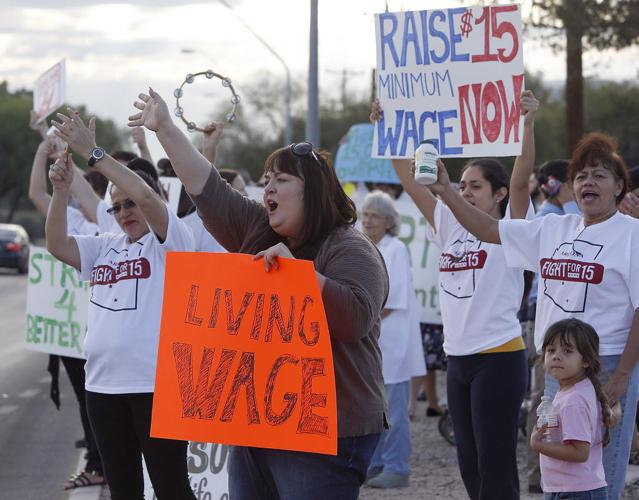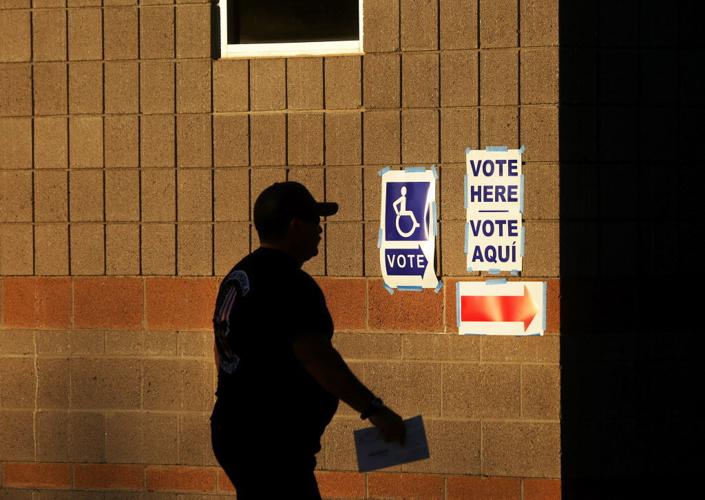PHOENIX — Business interests are making a last-ditch effort to keep hundreds of thousands of Arizonans from getting a big wage hike Sunday.
Attorney Brett Johnson, representing the Arizona Chamber of Commerce and Industry and other business groups, is telling the state Supreme Court that Maricopa County Superior Court Judge Daniel Kiley was legally wrong last week in refusing to block Proposition 206 from taking effect. He hopes to get the justices to eventually overturn that ruling.
But his more immediate aim is to keep the minimum wage from going up to $10 an hour Sunday as voters mandated. So Johnson is asking the justices for what amounts to an emergency order blocking what voters approved until they hear the full arguments.
With just days until the measure takes effect, the justices will need to rule on that by Friday, the last business day of the year.
Foes have an uphill fight. To get an injunction they need to show not only hardship but also both a likelihood of success after a full-blown trial as well as how halting the law would be in the public interest.
Kiley found against the business interests on all counts. But Johnson told Capitol Media Services on Wednesday this is precisely the kind of case where an injunction is appropriate.
“While the Supreme Court is dealing with this issue, there’s going to be significant ramifications for employees, for employers,” he said.
“Those all need to be taken into context,” Johnson said, because if the justices ultimately conclude the measure is unconstitutional “those hardships can’t be undone.” Anyway, he said, no one is harmed if the law is put on hold until a trial occurs.
“A guy who’s making minimum wage on Dec. 31 will still make minimum wage on Jan. 1,” he said. “That’s maintaining the status quo — and the whole reason why you get a preliminary injunction.”
But Kiley, in his ruling, saw the issue differently.
“In the court’s view, delaying the promised pay raise would impose a significant hardship on low-wage workers,” he wrote. And he said it’s irrelevant that they might be able to get a check for the difference months — or years — later if the courts eventually uphold the legality of the pay hike.
The heart of the battle is a state constitutional provision that says any voter-approved measure that mandates the spending of state funds must also have a separate dedicated revenue source to pay for it.
Johnson cited pleadings submitted by two state agencies that claim that boosting the minimum wage will force them to spend more.
In the case of the Arizona Health Care Cost Containment System, the state’s Medicaid program, the issue is the contracts it has with private firms to provide things like nursing home and in-home care, contracts built on the current minimum wage of $8.05 an hour. AHCCCS officials said they are planning to increase payments by close to $50 million to help contractors who say they may go out of business if they have to pay their workers more but the state reimbursement rate remains the same.
The Industrial Commission of Arizona, which polices the state’s labor laws, contends the change in the wage and the new mandate for paid time off will require, at the very least, new signs. It also claims it will have to hire more workers to enforce the personal leave policy.
But Kiley said nothing in Proposition 206 actually forces either agency to increase its budget. That’s backed up by AHCCCS’s own legal filings which conceded that an increase in payments to providers is not automatic but is based on several factors, only one of which is what contractors pay their workers.
But Johnson said it’s irrelevant that Proposition 206 itself does not tell state agencies to increase funding.
“What they’re saying is, ‘We may not have to because of these different workarounds,’” Johnson said. “The reality is that they have no choice,” he said, including to comply with federal Medicaid law that requires the state to have an adequate network of outside providers.
Both state agencies being used by Johnson to make his case are run by directors appointed by Gov. Doug Ducey who opposed Proposition 206. But press aide Daniel Scarpinato said the filings are not part of any effort by his boss to undermine the initiative but are merely providing “all the information the court asked for in a factual manner.”
Hanging in the balance is the take-home pay of about 770,000 Arizonans, the number that Proposition 206 organizer Tomas Robles said are currently making less than $10 an hour under the state’s current $8.05 minimum. Even more will be affected by 2020 when the initiative mandates a $12 minimum.
But Proposition 206 has something that was not in the original measure.
Beginning July 1, it requires companies with fewer than 15 employees to provide 24 hours of paid sick time per year to each worker. Larger firms have to give workers 40 hours of leave.
Foes of the initiative are not relying solely on that question of whether Proposition 206 actually will result in increased state spending. Attorney Tim LaSota is advancing a separate argument that the pay hike and the sick time are two distinct issues that should have been presented in separate ballot measures to voters.
But Kiley said there are flaws to that argument.
He said any such challenge should have been made before the issue got on the ballot and was approved.
Anyway, the judge said, requirements for separate amendments apply only to constitutional provisions. Proposition 206 only deals with state laws.
And even if none of that were true, Kiley said the two provisions are sufficiently interrelated to be two parts of a single plan.
“An increase in the minimum wage and the establishment of mandatory sick leave are topically related to the subject of minimum conditions of employment,” he wrote.
Foes of Proposition 206 face more than just initiative supporters.
Attorney General Mark Brnovich interceded with the express goal of defending not only what was approved at the ballot with 58 percent of the vote but also the constitutional provisions that allow voters to make their own laws.





